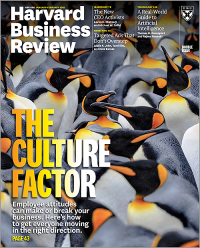
Computer File
Harvard Business Review: Vol. 1 January - February 2018
Once upon a time, CEOs steered away from political controversy. Who could blame them? Weighing in on divisive topics could alienate as many potential customers as it might win over. That’s not to say that corporate leaders were apolitical. They and their organizations have long been active in the process—supporting PACs and lobbying to shape rules and regulations that directly affect their businesses.
Now all bets are off. Social upheaval and government paralysis, particularly in the United States, are spurring CEOs to speak out on an array of contentious subjects. Such leaders as Tim Cook of Apple, Marc Benioff of Salesforce, and Kenneth Frazier of Merck have advocated for causes that aren’t obviously related to their companies. Among the issues they’re taking on: LGBTQ rights, immigration, racism, and the environment. As Ronnie Chatterji of Duke’s Fuqua School of Business and Mike Toffel of Harvard Business School note in “The New CEO Activists,” this newfound boldness is often born of personal conviction.
But some CEOs, say Chatterji and Toffel, also are joining the debate because the changing business climate demands it of them. Today their shareholders, employees, partners, and customers expect them to take a stand. Though it’s hard to tease the strands of motivation apart, what’s clear is that as more CEOs assert their views, more will be emboldened to follow. In addition, the failure to speak out on divisive questions can now be viewed as its own kind of statement and provocation. As Chatterji and Toffel argue, “Increasingly, CEO activism has strategic implications: In the Twitter age, silence is more conspicuous—and more consequential.” For corporate leaders, being apolitical may soon be impolitic.
The containts of this series talking about customer satisfaction depends on creative problem solving, research: negative feedback rarely leads to improvement, the chairman of Ryohin Keikaku on charting Muji’s global expansion, the leader’s guide to corporate culture, marketing: ads that don’t overstep, managing people: can MOOCs solve training problem; and how to hire employee in organizations, the new CEO activists, innovation: finding your company’s second act, Artificial Intelligence for the real world, managing organizations: more than a paycheck, inclusive growth: profitable strategies for Tackling poverty and inequality, the case for plain-language contracts, self management: the best leaders are great teachers, case study: "are our customer liaisons helping or hurting?", and life's work: John Adams.
Ketersediaan
| E00057 | 650.05 HAR | My Library | Tersedia |
Informasi Detail
- Judul Seri
-
-
- No. Panggil
-
650.05 HAR
- Penerbit
- Boston, Massachusetts : Harvard Business School Publishing., 2018
- Deskripsi Fisik
-
p. 1-129 : illustration; cm.
- Bahasa
-
English
- ISBN/ISSN
-
-
- Klasifikasi
-
650.05
- Tipe Isi
-
text
- Tipe Media
-
computer
- Tipe Pembawa
-
other (computer)
- Edisi
-
Vol. 1 January - February 2018
- Subjek
-
Organizational innovation
Information technology
Business Magazine
Self management
Management -- strategy
Marketing - global expansion
Leadership -- corporate culture
Cultural dynamics
Organization cultural profile
Marketing -- overstep
Training management
Leadership -- activists
Personnel strategy
Artificial intelligence
Blue collar jobs
Plain language contract
Creative problem solving - Info Detail Spesifik
-
-
- Pernyataan Tanggungjawab
-
The views expressed in articles are the author's and not necessarily those of Harvard Business Review.
Versi lain/terkait
Tidak tersedia versi lain
Komentar
Anda harus masuk sebelum memberikan komentar
 Karya Umum
Karya Umum  Filsafat
Filsafat  Agama
Agama  Ilmu-ilmu Sosial
Ilmu-ilmu Sosial  Bahasa
Bahasa  Ilmu-ilmu Murni
Ilmu-ilmu Murni  Ilmu-ilmu Terapan
Ilmu-ilmu Terapan  Kesenian, Hiburan, dan Olahraga
Kesenian, Hiburan, dan Olahraga  Kesusastraan
Kesusastraan  Geografi dan Sejarah
Geografi dan Sejarah  E-Book
E-Book